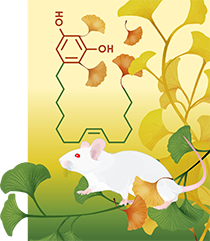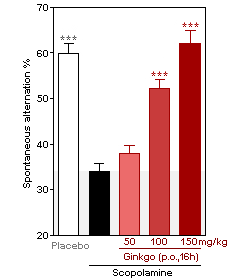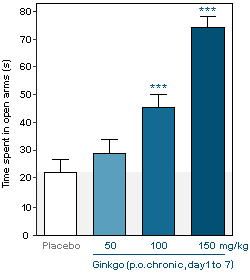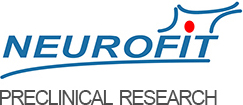Newsletter # 91

Animal models

 At Neurofit, one single administration of Ginkgo biloba extract 16h prior to the testing is sufficient to improve cognitive deficit in the mice. Furthermore, a reduced anxiety behavior is observed after 1-week daily treatment.
Mechanisms of action may include free radical scavenging, neurotransmitter/receptor modulation and antiplatelet properties.
At Neurofit, one single administration of Ginkgo biloba extract 16h prior to the testing is sufficient to improve cognitive deficit in the mice. Furthermore, a reduced anxiety behavior is observed after 1-week daily treatment.
Mechanisms of action may include free radical scavenging, neurotransmitter/receptor modulation and antiplatelet properties.
1: doi: 10.1371/journal.pone.0052755
2: doi: 10.3390/jcm10143151
-

Cognitive performance assessed in the
T-maze alternation task Left panel: The graph shows the cognitive performance of mice as measured by their spontaneous alternation in the T-maze. Scopolamine-induced deficit is evidenced by the decrease in thespontaneous alternation of mice (white vs black column), which reflects a repetitive insistence (stereotypy) on the visit of the same arm of the T-maze.
The administration of Ginkgo biloba dose-dependently improves the spontaneous alternation performance of scopolamine mice, hence their cognitive ability (Black vs red columns).
-

Anxiety-like behavior assessed in the
Elevated Plus-Maze test Right panel : The graph shows the anxiety status of mice in the Elevated Plus Maze test (EPM). It is a commonly used test to evaluate theanxiety-like behavior of mice in one single trial. The test is based on an approach/avoidance conflict between the drive to explore novel areas and the aversion to brightly lit, open spaces. Hence, increase in the time spent in the anxiogenic area (open arms) during the trial is an indication of potentialanxiolytic effect of test compounds .Herein, the treatment of mice with Ginkgo biloba induces a dose-dependent increase in the time spent in the open arms suggesting a reduced anxiety status of mice.
Get in touch


 PREVIOUS
PREVIOUS